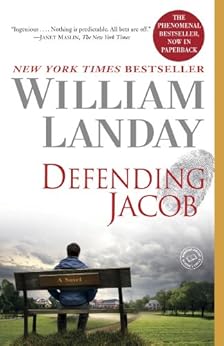Yesterday, I posted a list of books that have a twist. On that list was one book I read a while back, but for which I never posted a review: Defending Jacob by William Landay. I thought I’d post it today.
3
Stars
Andy Barber
is an Assistant District Attorney in charge of a case involving the murder of a
young boy from his son’s school. When his 14-year-old son Jacob is implicated
in the death, Andy must step down and concentrate on helping his son defend
himself from a zealous, ambitious prosecutor whom Andy mentored.
The novel is
told in first person by Andy although his narration is interspersed with
excerpts from a grand jury hearing held after the verdict in Jacob’s trial. One
of the questions not answered until the end is what the hearing is
investigating. Obviously, the other main question is whether Jacob is guilty or
innocent. Jacob does little to help himself because of his taciturn nature.
When he does speak, it tends to be almost in monosyllables.
This book
is a courtroom drama, but it also examines a number of other issues: the role
of nature versus nurture in criminal activity; bullying; the justice system,
especially the professional ethics (or lack thereof) of lawyers; the limit
parents will go to defend their children. I was especially interested in Andy’s
thoughts about how life before and after the murder charge, regardless of the
verdict, will be very different because even a non-guilty verdict does not
necessarily remove the aura of guilt in the eyes of the public.
The book
jacket describes the book as a “character-driven mystery,” but I wasn’t overly
impressed with the characterization. I was amazed by how little both Andy and
his wife Laurie knew about their son. It is only after the murder charge that
they learn about some of their son’s activities, how others perceive him, and
his life at school. Many teenagers tend to be withdrawn and reluctant to share
with their parents, but for educated people, these two seem especially obtuse.
Laurie’s
behaviour is particularly problematic. There is no doubt that she loves her son
and is anguished by the situation, but some of her actions cause more harm than
good. Andy admits, “Laurie was so determined to help Jacob she nearly hung him”
(140). She is more willing than Andy to examine Jacob’s behaviour, but for a
teacher working with children, she seems very unaware about how to draw out
information from her own son.
The ending
is a surprise of course, although the author does include considerable
foreshadowing throughout for the observant reader. The most obvious clues are
the repeated references to the “emotional damage” that Laurie suffers. As soon
as the charge is laid, Andy notices changes in his wife. For me, the most
telling statement came midway through the book when Andy describes changes in
her appearance: “her hair was getting grayer and sloppier, and her face
becoming crazed with lines like an old ceramic vase.” He also admits at that
time that he was a fool “to save Jacob first and heal Laurie later” (201).
I read this
book because someone somewhere suggested it was similar to The Dinner by Herman Koch. There certainly are similarities: both
explore the lengths to which parents will go to protect their children and
whether nature or nurture is more significant in determining personality and
behaviour. In the end, I prefer Koch’s novel in terms of literary quality.

No comments:
Post a Comment